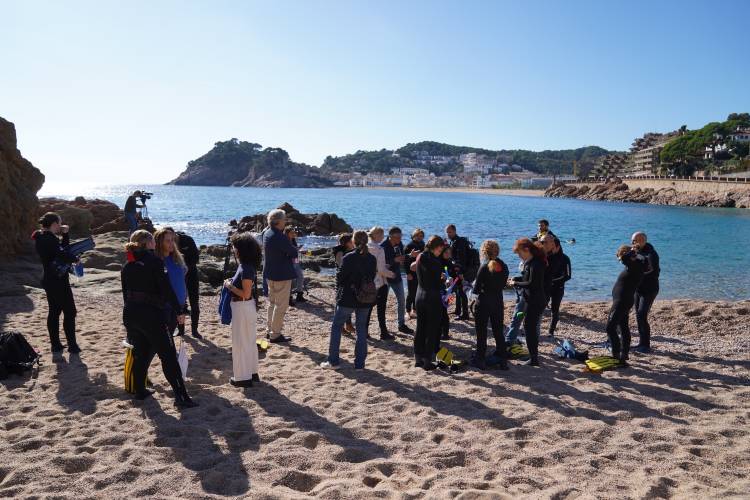News

Showing journalists how citizen science contributes to expanding knowledge about ocean warming
17/11/2023
We held a day in which 13 different media were shown the role of marine citizen science in generating scientific knowledge about ocean warming.
Citizen science is an effective instrument to involve society in the development of knowledge and channel it towards better management. For this reason, the LIFE INTEMARES project promotes marine citizen science in alliance with Observadores del Mar, a CSIC reference platform.
Currently, the platform has 17 active projects dedicated to marine conservation and focused on different scientific areas: biodiversity, exotic species, threatened species, impacts and climate change. 110 researchers from more than 60 research centers, universities and organizations, both Spanish and from 12 other countries, participate. On the citizen side, it has the collaboration of more than 5,500 observers and 490 entities that have recorded more than 22,000 observations, which supports the trajectory of this great community of sea lovers.
Thanks to this alliance, we have managed to strengthen the research network made up of citizens, the scientific community and other key local actors, with the aim that the scientific knowledge generated can be transferred to the administrations competent in the management of protected marine spaces. This transfer is carried out through the integration of information in the Spanish Nature Data Bank, among other repositories, where the data is available to managers.
Furthermore, the support of the LIFE INTEMARES project has made it possible to strengthen and expand the network of Observadores del Mar from the Levantine-Balearic demarcation to the rest of the marine demarcations, especially to the entire Spanish marine Natura 2000 Network.
OCEAN WARMING THROUGH CITIZEN SCIENCE
In recent years, the Mediterranean has reached the highest temperatures recorded so far. Marine heat waves are starting earlier, lasting longer, and becoming more intense and frequent. This affects marine life, causing, among other effects, the redistribution of species and mortality phenomena. Mobile species, such as fish, can change their distribution, and some invasive species, accustomed to warmer climates, can colonize new areas. For species that live fixed to the substrate, such as corals and sponges, high temperatures can cause significant mortality or affect vital processes such as reproduction.
Observadores del Mar provides adapted protocols so that citizens can report these phenomena with the greatest possible rigor: the platform has already collected data on coral mortality, through the Coral Warning project, the distribution of fish that are indicators of climate change, through of the Climate Fish project, massive blooms of Posidonia oceanica, as well as the arrival of invasive species, such as the algae Asparagopsis taxiformis and the puffer fish Lagocephalus sceleratus.
The Hidden Deserts project addresses the disappearance of kelp forests, as a consequence of climate change, among other factors.
During the day, 21 journalists from 13 attending media were able to learn about these projects first-hand. On the one hand, they visited the laboratory of the Center for Advanced Studies of Blanes (CEAB), where they saw samples of how ocean warming affects marine life through the acquisition of data on the presence of invasive species, climate-indicator fishes and coral mortality, collected on the platform and offered by citizens.
In addition, to learn about the data collection process, the day was complemented with a practical session in the town of Tossa de Mar (Girona), where the attending journalists did a snorkel dive with to the SuperDive Tossa diving center, one of the sentinel observatories that collaborates with Observadores del Mar. This allowed journalists, guided by a scientific team, to identify evidence of the impact of ocean warming on marine species and habitats.
The LIFE INTEMARES project, coordinated by the Biodiversity Foundation of the Ministry for the Ecological Transition and the Demographic Challenge, advances towards the objective of achieving effective management of the marine spaces of the Natura 2000 Network, with active participation of the sectors involved and with research as basic tools.
MEDIA IMPACT SELECTION
Un proyecto catalán sobre efectos del cambio climático en el mar se extiende a todo el Estado - La Vanguardia
Aumentan los desiertos submarinos en el Mediterráneo - El Periódico
Pocas algas y demasiados erizos: los desiertos submarinos avanzan en el Mediterráneo - El Periódico
Los Observadores del Mar toman el pulso al Mediterráneo - “Reserva Natural” RTVE
